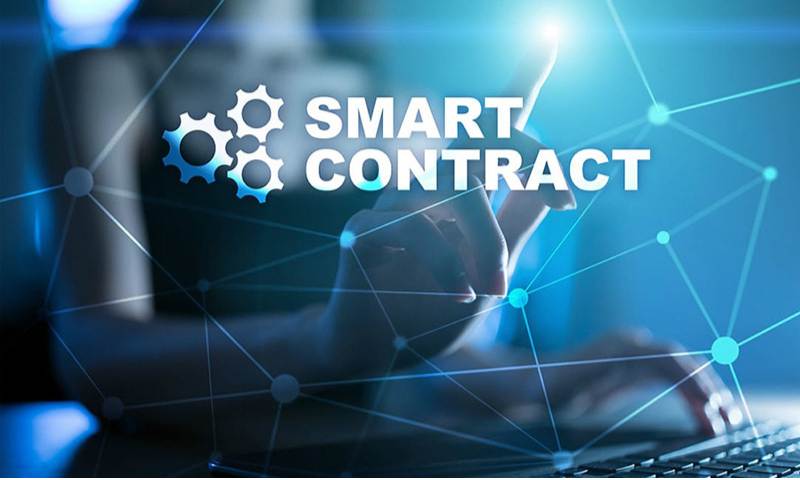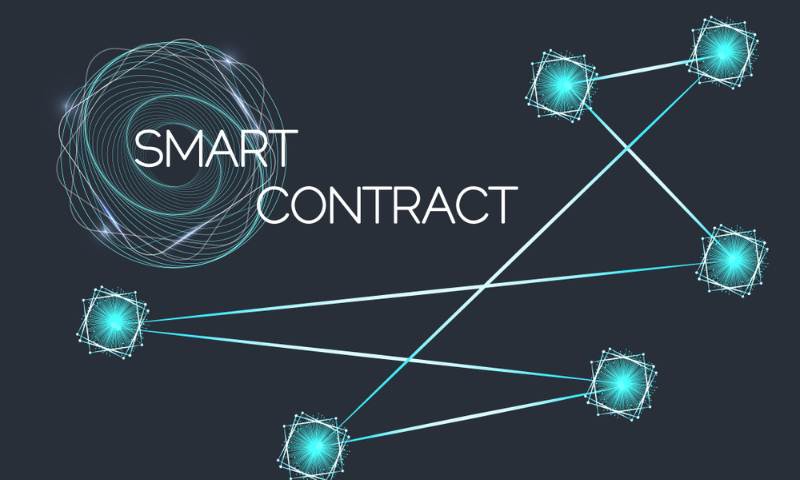Evolution of smart contract technology isn’t just a fancy term—it’s a game changer. This journey starts with lines of code that shake hands and ends with a future where deals seal themselves. When smart contracts came along, they didn’t just march onto the tech stage; they danced, bringing with them a new level of trust for digital transactions. Here, I’ll unlock this dance of the self-executing contracts and show how they’re lining up to redefine our world. Think less paperwork, more action. Join me as we explore the roots, the leaps, and the bounds towards a smarter, automated future.
The Roots and Initial Growth of Smart Contract Technology
Unpacking the History of Smart Contracts
Smart contracts helped change how we do deals. They’re like robots who make sure a contract happens without us. It started way back in 1994. A man named Nick Szabo thought of it. He said just like a vending machine, contracts could work on their own if set right. These digital contracts live on blockchain, a kind of list that nobody can mess with. The idea slept for some time, as we didn’t have the right tech yet.
Bitcoin brought smart contracts into real play. But, it couldn’t do much. It was like a baby’s first steps in a long walk. The main show was still to come. And wow, it did come when Ethereum showed up, bringing new life to these contracts.
The Emergence and Role of Bitcoin Script Contracts
Bitcoin script contracts were like the seeds. They showed us what’s possible. These scripts set simple rules, like who can get Bitcoins and when. But they had limits. They’re not as smart as we wanted them to be. Think of them like a light switch – they can turn things on or off but can’t do much else.
Then came Ethereum, and with it, Solidity – a language made just for smart contracts. Now, these contracts could do way more. They could hold money till conditions met and even work with other chains of blocks, all secure and without any middle-man.
Smart contracts took off fast. More and more people made dApps – apps that don’t need a middle-man. These apps can do all sorts of things by themselves. From games to trading money, they made a new world of doing things online.
With these contracts, we’ve got smart legal papers too. These are contracts that know the law and follow it, all by themselves. This helps a lot in finance, where deals need to be tight and right.
We’re also seeing cool integrations, like with Chainlink. They let these contracts know stuff outside the blockchain. This means contracts can now understand and use info from out in the world, like weather for farming deals or scores for sports betting.
And there’s more, like Tezos contracts trying new things. Or how we’re using blockchain for smart things, like tracking packages or making sure things are real and true. Plus, people are making systems where we can trust what happens without needing a middle-man.
The road forward is huge. We’re working on making contracts better at handling errors and smarter at not wasting resources. People are checking contracts to plug any security holes and to keep them safe from hacks. And we’re figuring out how to make them play nice with rules set by governments, so they can stand strong far into the future.
With every day, smart contracts get smarter, better, and touch more parts of our lives. They’re not just for money; they’re opening doors we didn’t even know were there. And that, friends, is a glimpse into the roots and early days of smart contracts – a true digital revolution in the making.
Ethereum’s Impact on the Smart Contract Landscape
The Development and Advancements in the Solidity Programming Language
Ethereum changed how we do business online. It did this through its own language called Solidity. Solidity allows people to create smart contracts that are both powerful and complex. These contracts work by themselves, without any need for middlemen. This means that when certain conditions are met, the contract automatically does what it needs to do.
Did you know that Solidity has made it much simpler for programmers to build smart contracts? It really has. Before Solidity, creating smart contracts was harder and not many people could do it. But now, thanks to Solidity, more people can build smart contracts, and this is great for everyone.
Ethereum offers a platform where these self-operating bits of code can live and run. Think of it as a world computer that never stops. This lets us do things like send money around the globe in seconds. We can also sell houses without going through lots of paperwork.
Smart contracts on Ethereum can join with other contracts, share files, and make decisions. This is pretty cool because it’s like having a robot that can do many things without us telling it what to do each time.
From DAOs to dApps: Ethereum’s Vast Ecosystem
Now, let’s talk about DAOs and dApps. DAO stands for Decentralized Autonomous Organization. It’s a group managed by rules written in smart contracts. No bosses here! And dApps? They are apps that run without any person or company controlling them. Both are part of what Ethereum offers.
Bitcoin was the first coin, but it couldn’t do much with its contracts. Ethereum came in and said, “We can do much more!” This started a big change in how we use the blockchain for more than just money.
People have made games, exchanges, and even voting systems using Ethereum’s tech. Each of these uses smart contracts to work without any hiccups. It’s really a new frontier for the internet.
As Ethereum grows, its team is always finding ways to make it better. They focus on things like making it faster and more secure for everyone. This helps more businesses to start using Ethereum for their own smart contracts.
Building on Ethereum can be tricky and gas fees—what you pay to run your contract—can be high. But this doesn’t stop people from coming up with new ideas. They are always working on solutions for these issues.
Solidity has also improved over time. It started off pretty basic but now it’s very advanced. This means programmers can write smarter contracts that do a lot more.
Ethereum has really opened our eyes to what’s possible with the blockchain. It’s not just about sending coins anymore. Now, we’re making entire systems that work all on their own. And this is just the beginning. The future looks bright for Ethereum and the many things we’ll build on it.
Smart Contract Integration Across Industries
Revolutionizing Finance with Automated and Legal Smart Contracts
The money world loves automation. Banks and businesses are seeing big changes because of smart contracts. These digital promises cut out the middle man, making things cheaper and quicker. It’s like shaking hands on a deal, but with a computer doing the grip.
Smart contracts explained in finance? Easy. They’re just programs that run when rules are met. Let’s say you borrow cash from a friend. In the old days, you’d write down the promise to pay it back. If you forgot, your friend might never see the cash again. With smart contracts, you both agree to the loan rules. A blockchain records it. You can’t say you forgot. The smart contract remembers and can even move the money for you.
Now, think big, like trading millions in stocks or managing home loans. Smart contracts make this super fast and less of a headache for everyone.
No need to trust a stranger. The blockchain keeps everyone honest. This is a game-changer for money stuff – no fibbing, no lost files, just trust in the tech.
The Role of Oracles and IoT in Expanding Smart Contract Capabilities
Okay, so we’ve got these smart contracts. But, how do they know stuff? Say, the price of gold, or if it’s raining? That’s where Oracles and IoT come in. They’re the messengers that say, “Hey contract, this thing happened.”
Oracles check facts and tell the smart contracts. This might be prices, scores, or news. Imagine you bet on a game with a smart contract. You win if your team wins. An Oracle checks the score and tells the contract, “They won!” Easy, right?
IoT stands for Internet of Things. It’s all about gadgets that talk to the internet. Your fridge, car, or thermostat could be part of it. Now with smart contracts, IoT gets smarter. Your fridge orders more milk before you run out. A car starts its lease payments only when you start driving.
Smart contracts and IoT can team up to make life smoother. They do the thinking and acting for us, saving time and mix-ups.
Together, Oracles and IoT make sure smart contracts have the right info at the right time. It’s like giving eyes and ears to these lines of code. With them, the contracts get to work when exactly needed, no waiting needed.
In short, finance is just one stop for smart contracts. With Oracles and IoT, they’re jumping into all parts of life. They shake things up in how we sell, buy, and trust. It’s a smart contract world more and more, and we just live in it. With each passing day, they get better, reaching far beyond just cash and coins. Watch this space – smart contracts aren’t done yet. They’ll touch everything we do, from big bucks to the morning buzz of our alarm clock.
The Present and Future of Smart Contracts
Innovations in Smart Contract Scalability and Interoperability
Think about smart contracts as tiny robots inside blockchain. They follow rules to do tasks without people needing to check on them. Now, these robots can talk to each other even when they’re from different places, thanks to better tech. That’s what we call “scalability” and “interoperability”.
Now, why does this matter? As we use smart contracts more, we want them to work fast and with others, even on different blockchains. Imagine a video game where you can trade a weapon from one game to another. That’s where we’re heading.
Picture a bridge linking two islands. That’s how these robots are getting along. One called Ethereum started this. It’s like the main street for these bots. Others, like Tezos and Chainlink, join in, making a big network. This change helps everyone, like when your phone works with all sorts of apps.
Navigating Regulations and Enhancing Security in the Digital Contract Era
Now, with new power comes new rules. All this tech talk means nothing if it’s not safe. Security is king in the world of smart contracts. Think of a contract as a vault. If it’s easy to crack, no one would use it. That’s why people like me keep a keen eye on making these digital vaults tough as nails.
We deal with laws too. Just like driving a car, you need rules to stay safe. But these laws change as we learn more. We’re all part of making sure smart contracts play by the rules and keep your stuff safe.
For a moment, focus on how a contract is made. To build it, coders use “Solidity”, it’s like the bricks for the contract house. Programmers become builders. With every new line of code, they hammer in another nail. This helps them fix problems and stop sneaky folks from getting in.
Remember those gas fees, kind of like a ticket for a ride at the fair? We’re working on making them cheaper, too. That way, more people can use these smart contracts.
So, as we look ahead, smart contracts are more than just code. They’re like a city growing, getting better roads, stronger buildings, and clearer signs. They change the way we swap things and trust each other, without anyone pulling the strings.
Why does all this matter to you? Well, it’s about doing stuff with a simple click. Pay for a coffee, sell a bike, or even rent a house. It’s getting easier, faster, and safer. Soon, this won’t just be tech talk. It’ll be part of our everyday lives. And that’s the future we’re unlocking with smart contracts.
To wrap things up, we’ve seen the journey of smart contracts from their roots to their role in today’s digital world. We started by exploring how smart contracts came to be and how Bitcoin played a part in their growth. Then we looked at how Ethereum made big changes in the scene, creating new tools and a whole world of dApps. Next, we saw how these digital contracts are changing industries, especially finance, and how they’re growing with help from oracles and the Internet of Things. Lastly, we peeked into the current smart contract innovations and the challenges that come with them, including keeping them safe and working within the law.
Smart contracts are clearly more than just a tech buzzword; they’re a game-changer, making businesses faster and more reliable. And guess what? This is just the beginning. As we push forward, expect smarter contracts, wider uses, and more changes. The future looks bright for smart contracts, and I’m excited to see where they take us next!
Q&A :
What is the origin and development of smart contract technology?
Smart contract technology has its roots in the early 1990s when computer scientist and cryptographer Nick Szabo first coined the term “smart contract.” Szabo imagined a digital protocol that would automatically execute, control, and document legally relevant events according to the terms of a contract. This vision remained mostly theoretical until the advent of blockchain technology with Ethereum in 2015, which provided a decentralized platform where smart contracts could be programmed and run without the need for a middleman.
How do smart contracts actually work within blockchain technology?
Smart contracts function as self-operating computer programs that automatically execute predefined actions when certain conditions within the blockchain are met. These contracts are stored on the blockchain, ensuring immutability and transparency. When a triggering event is recognized by the network—such as a payment received or a deadline met—the smart contract processes the instructions coded within it, which could include transferring funds, registering a vehicle, or issuing tickets.
What are the current trends and future potential for smart contract technology?
The sphere of smart contract technology is rapidly evolving, with current trends focusing on increasing security, enhancing interoperability, and reducing costs. The future potential is vast, including the automation of complex legal and financial operations, integration with Artificial Intelligence (AI) for self-adaptive contracts, and creating entirely decentralized autonomous organizations (DAOs). With cross-chain technology, smart contracts might soon operate seamlessly across different blockchains, further expanding their utility.
How has smart contract technology impacted industries beyond cryptocurrency?
Smart contract technology has far-reaching implications beyond the realm of cryptocurrency. It has the potential to revolutionize various sectors by automating processes, reducing fraud, and removing intermediaries. Notably, industries such as real estate, supply chain management, healthcare, and intellectual property have begun implementing smart contracts for tasks like transferring property titles, tracing product origins, managing patient consent, and automating royalty payments, respectively.
What are the main challenges in the adoption of smart contract technology?
Despite its potential, smart contract adoption is hindered by several challenges. Key concerns include scalability issues on the host blockchain networks, limited legal recognition and regulatory frameworks, and potential security vulnerabilities that could be exploited in the contract’s code. There is also a significant learning curve associated with programming and understanding the implications of smart contracts, necessitating a skilled workforce to develop and manage them effectively.


